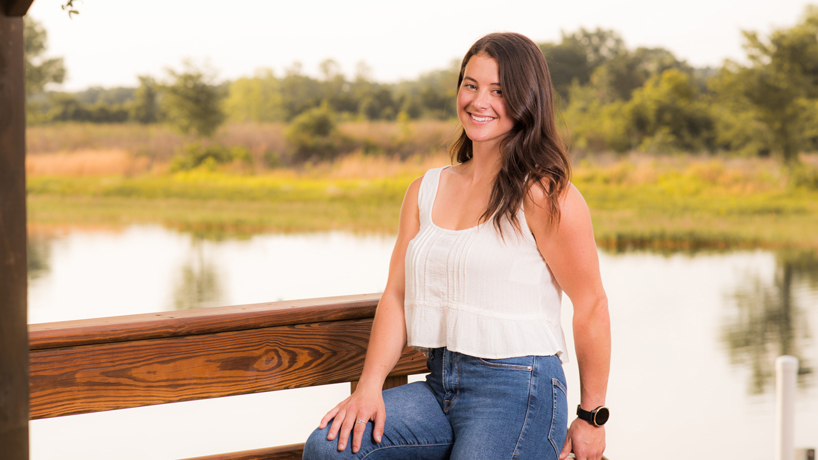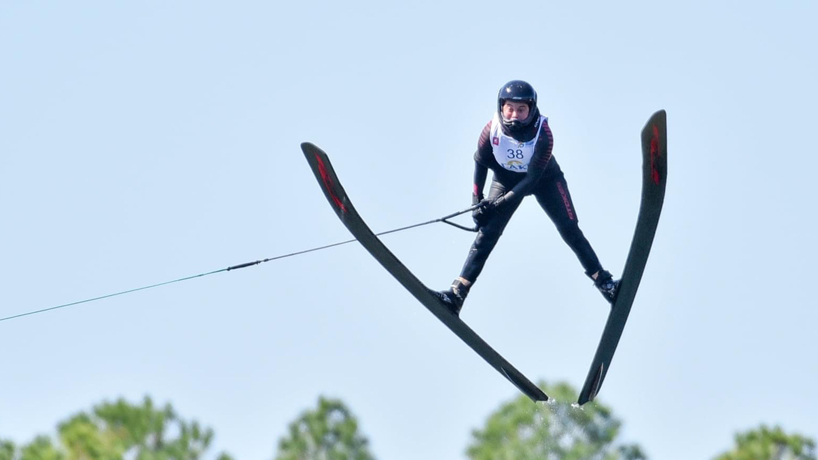
Doctoral candidate Lauren Morgan divides her time between criminal justice research and a career as a professional water skier. (Photos courtesy of Lauren Morgan)
Beth Huebner honestly doesn’t know how Lauren Morgan does it.
On the one hand, Morgan is a doctoral candidate at the University of Missouri–St. Louis, pursuing a degree in criminology and criminal justice and in the process of narrowing her dissertation research on so-called crossover youth – children and adolescents involved in both the child welfare and juvenile justice system.
She has already found a lot of success in her burgeoning career, including a child welfare policy internship position last summer at the Urban Institute in Washington, D.C., and an upcoming role as a research assistant for the National Institute of Justice.
But when she’s not engaged in research, Morgan is often found skimming across the top of some lake or launching herself off of a ramp at up to 65 miles per hour as she trains for her professional water skiing career. Last October, she won a bronze medal at the 37th IWWF World Waterski Championships in Groveland, Florida.
Lauren Morgan won a bronze medal at the 37th IWWF World Waterski Championships last October in Groveland, Florida.
“I’m in awe of her, really,” said Huebner, a professor in UMSL’s Department of Criminology and Criminal Justice and Morgan’s adviser. “We often talk quite early in the morning because after that she gets up and works, and she makes sure to have very clear goals every time we meet. I think that putting that structure into her life has only enhanced her research.”
The opportunity to pursue her PhD alongside her professional water skiing career was one of the reasons Morgan chose UMSL’s nationally recognized doctoral program in 2019.
“I applied pretty last minute to three different PhD programs, and I came to visit and just really loved it,” Morgan said. “I thought I would be able to fit in well because the program is a little bit more flexible in terms of letting you direct what you want to do, direct your studies, and once you get through coursework, you can be the boss of your career. So, I could decide if I wanted to ski a little bit and also get my work done.
“Beth’s really flexible with me but also holds me accountable. I make sure I get my work done. But she also understands that I have this other side of my career. I don’t think I would be able to water ski at the same level if I went somewhere else.”
Wanting to serve youth
Morgan had taken a break from competitive water skiing while she began pursuing her master’s degree in criminal justice and corrections at Seattle University in 2016.
During her graduate studies, she became interested in the foster care system, securing an internship as a case manager at You Grow Girl!, a nonprofit organization that provides a safe forum for girls in the foster care system to tackle their fears and insecurities, build self-confidence and be surrounded by supportive peers and adults.
It became clear right away that she’d also need to familiarize herself with the juvenile justice system because of the number of clients she encountered bouncing from one system to the other.
Morgan thought she might make a career as case manager or working in mental health therapy after finishing her master’s. She landed a full-time job as a residential youth counselor at Pioneer Human Services, which put her right at the intersection of the foster care and juvenile justice systems. The nonprofit operates a range of programs across Washington state, assisting people reentering society from prison, jail and the juvenile justice system as well as those who are overcoming substance use disorders and mental health issues.
“I was literally right across the street from the juvenile detention center, so I’d go there often,” Morgan said. “It was weird because our building had a contract with the juvenile detention center where if they were short staffed, they’d ask us to come over there. They were literally linked, which I thought was really weird and interesting.”
Case managers have regular opportunities to make a difference in their clients lives’ by offering support or connecting them to services, but the work can also leave them feeling helpless as they watch those clients struggle with systemic issues.
“A lot of it is out of their hands,” Morgan said. “A lot of it is bureaucratic practices that they really can’t have much say over. It’s sad to see their frustration.”
It didn’t take Morgan too many months of experiencing that frustration herself before she decided she wanted to be able to do more. Her decision to pursue her PhD was motivated by a desire to do research that could influence policy.
It just so happened that her friend Andrea Giuffre, who also earned her master’s in criminal justice at Seattle University, had enrolled in UMSL’s doctoral program in 2018. She suggested Morgan give the program a look.
She did and met Huebner, who has proved an ideal role model, displaying how research can guide the actions of policymakers.
Huebner serves as the project director for the MacArthur Foundation-funded Safety and Justice Challenge, which has been helping rethink the local criminal justice system while working to safely reduce St. Louis County’s jail population and eliminate racial inequities. A graduate research assistant, Morgan has worked with Huebner on several aspects of the project, including a new initiative to provide low-income defendants with access to attorneys ahead of their initial court appearances.
Not ready to let go
As Morgan was deciding on her academic future, she also realized she wanted to give competitive water skiing one more shot before it was too late.
The sport has been a part of Morgan’s life since she was young.
“My parents both water ski,” Morgan said. “My dad was a professional water skier as well, and he was a huge mentor to me because he also got his doctorate and also balanced the professional skiing career with that.”
Her parents got Morgan started on skis when she was in middle school and enrolled her at the Jack Travers Water Ski School near her home in Florida when she was 13 or 14. By the time she was 15, she’d moved to the school full-time and was home schooling with a small group of other kids around training for national and international competitions.
Morgan received a water ski scholarship to Florida Southern College, where she majored in psychology and served as the team captain of the water ski team.
She still remembers fondly many of the opportunities that came with the sport, including the chance to visit Japan for the World University Championships, and she feels a tremendous kinship with fellow competitors and others she’s met because of it.
“I’ve known most of the people in the sport for years, like my whole life, so it really just feels like a family, and that’s what I like,” she said. “I also really love traveling. I’ve been to over 25 countries for the sport. I would have never traveled to these places if it wasn’t for skiing.”
Ski careers tend to run out in a competitor’s early 30s, so Morgan, now 29, knew if she wanted to test herself in competition, she couldn’t afford to wait long.
After competing in each of the sport’s three disciplines – slalom, trick and jump – when she was younger, Morgan decided to narrow her focus to the jump event when resuming her career.
But she made sure she started off on solid academic footing in the UMSL doctoral program before she began.
“The first year I got here, I did not worry about waterskiing at all,” Morgan said. “I gave everything 100% to school, and I understood that was okay for that time. Then when I got the hang of things, I decided, ‘OK, I can start going to Florida every once in a while.’”
Finding a balance
The onset of the COVID-19 pandemic upended everyday life around the country almost overnight, but it came with unlikely benefits for Morgan’s training.
She moved back home to Florida as the UMSL campus shut down during the spring semester of 2020, and she had easier access to water to train as she closed out her first year of coursework remotely.
Even as campus started repopulating in the fall of 2020, Morgan had the flexibility to stay away when necessary, even while serving as a graduate research assistant to Huebner.
“The hybrid lifestyle really helped me,” she said. “All of my research was online. I was doing Zoom interviews, and I was also taking my comprehensive exams. That’s just a period where you’re writing and trying to get past those, and I had a lot of time to write from anywhere.”
Morgan felt blessed to have Huebner’s support as she spent time in Florida. She’s not sure every advisor would have been as understanding. But it allowed her to develop a routine that included skiing early each morning, coming back to do work and participating in meetings and then skiing again at lunch time or after work.
She’s done her best to continue it when back in St. Louis, where she skis at a private lake near Alton, Illinois. She also does a lot of off-water training with trainer Travis Brown.
“What has really helped is having to make every minute of my training count,” Morgan said. “Every time I go out in the water, it’s usually much more productive than it used to be when I would just water ski. When I’m on the water, I’m on the water 100%, and then when I’m in school, it’s school 100%. I’m good at not procrastinating because I don’t really have time.”
She’s been jumping as well as ever, including back home in Florida last fall when she flew 175 feet to capture the bronze medal at the World Championships. It was the first time she’d ever medaled in the competition, and she had her whole family on hand to see it.
“That was really special,” Morgan said.
She recently began training for her next season of competition and would like to pursue water skiing another year or two while she works on her dissertation.
Huebner sees the chance for her to do impactful research.
“She’s been doing this mapping of the juvenile justice system in St. Louis city and the county, and I think that sort of work can change the way things are done,” Huebner said.
Morgan’s role with the National Institute of Justice only expands her potential influence. The projects she’ll be working on might inform policy set by the Biden Administration.
Huebner believes the confidence Morgan has acquired while performing on skis will only help her as she begins to plot her future, whether she winds up on faculty at a university or working on policy at a think tank.
“She has that confidence to speak for herself, which I think is a really important skill,” Huebner said. “I could not be could not be more proud of her, and I can’t wait to see what she does next.”















